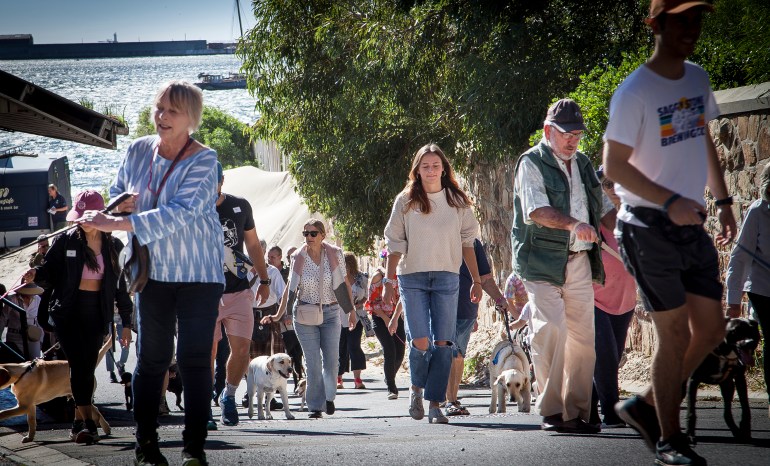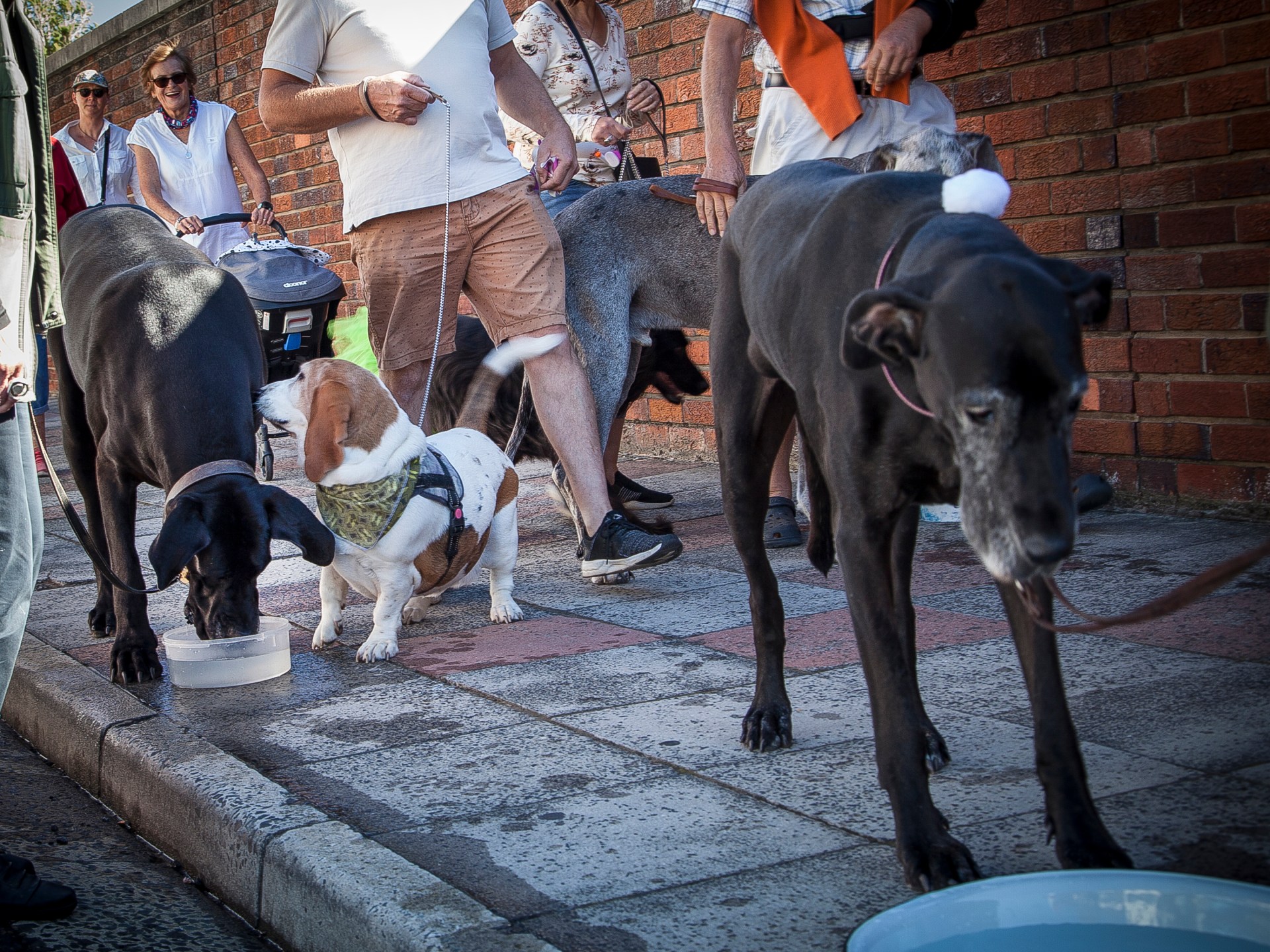Cape Town, South Africa – Just Nuisance, who died 80 years ago this week, was the first dog in the world to receive an official Royal Navy rank. Every April, humans and canines flock to the naval suburb of Simon’s Town to celebrate his life with cake, walkies and a pipe band. Last year, about 80 dogs turned up. This year’s festival kicks off at 10am on Saturday, April 6.
Cathy Salter, the curator of the Simon’s Town Museum, is thrilled that the dog’s legacy of lifting human spirits lives on: “There was an awful war going on [World War II] and most of the sailors passing through Simon’s Town were very young,” she says. “For them, it was quite a big deal that this dog wanted to hang out with them.”
“Many years ago, we were sent a photograph of Just Nuisance by a man who’d been taken POW by the Japanese,” Salter told Al Jazeera. “He wasn’t allowed any personal possessions, but he managed to smuggle that photo in and keep it with him throughout. It just shows how important Just Nuisance was to them.”
Who was Just Nuisance?
A pedigreed Great Dane born on April 1, 1937, Just Nuisance was bought by a man who worked in the naval port of Simon’s Town. “The dog took an instant liking to the sailors,” says Salter. “But only the low-ranking ones. He’d have nothing to do with officers,” whom he identified by their uniforms. While numerous sailors tried to adopt him, according to his biographer, Terrence Sisson, “Nuisance was his own master.”
At 67kg (148 pounds) Just Nuisance was “massive,” even for a Great Dane, and “almost human in concept and intelligence”, writes Sisson, an ex-sailor who knew the dog personally. After doing his business, for example, Just Nuisance would thrust out a paw to demand a “handshake” from the nearest human.
He was given his name sometime in 1938 after being “enticed aboard” the HMS Neptune, writes Sisson. He got into the habit of “sunning himself, lying full length”, in one of the busiest parts of the ship. The “exasperated crew” had to pick their way around this tangle of legs and tail, “and although they were all fond of the dog, their language directed at him was certainly not suitable for the ears of females and young children”. Just Nuisance was a sanitised version of these insults.
What happens at the festival?
Registrations commence at 9am on April 6 at Long Beach, Simon’s Town. All dog breeds are welcome.
Proceeds of the 50 rand ($3) entrance fee per pooch go to two local animal welfare charities, Tears and the SPCA. The 1.1km (0.7-mile) walk – led by a Scottish pipe band – begins at 10am, explains volunteer event organiser Esther Le Roux, adding that “biodegradable poop bags and water bowls are provided”.
The walk ends at the statue of Just Nuisance in Jubilee Square, overlooking the harbour, and birthday cake is provided on a first come, first served basis. Prizes are awarded in categories that “are made up on the spot”, explains Le Roux, and might include “most similar dog and human”, “best-dressed dog” and “closest Just Nuisance lookalike”.
“I’m so glad it falls in April,” says Le Roux, “It’s outside the silly season and the tarmac isn’t so hot as to burn the dogs’ paws.” Why should people come? “It’s such a feel-good event and there really isn’t an agenda,” she says. “Nobody’s in it for themselves.”

Where can I learn more?
For those who can’t attend the event in person, there are other ways to learn about the famous canine. The Simon’s Town Museum has a very thorough section on Just Nuisance, alongside displays about Simon’s Town’s community history, including the town’s forced removals during apartheid.
A bronze statue of Just Nuisance, by local sculptor Jean Doyle, has enjoyed pride of place in Jubilee Square, overlooking the waterfront, since 1985. Doyle has a Great Dane of her own and she attends the festival when she can. A few years ago, she cast a new hat for Just Nuisance after the original was stolen. Before you snap a selfie with the famous hound, please note that the statue is “nowhere near big enough to be life-size,” says Salter.
Finally, it’s possible to visit Just Nuisance’s grave by car (turn left into the Naval Signal School at the top of Red Hill Road) or on foot. The trail starts at the top of Barnard Street, but be warned: there are more than 300 steps and the only way is up. But the views of False Bay are spectacular.
Why was Nuisance enlisted in the Royal Navy?
There is, says Salter, “a long, proud tradition of animals on Royal Navy ships. Dogs, cats, leopards, bears … you name it. But he was the only one to be given a rank.”
The reasons for this were rather prosaic. Just Nuisance got into the habit of riding the train to Cape Town with his sailor friends who, in Sisson’s words, “did not bother to buy him a ticket – thus starting a vendetta between Nuisance and the officials of the South African Railways”.
At first, the sailors tried hiding the “Hercules of Dogdom”, as Sisson coined him, under the seats but this did not work. Then they started opening carriage windows to allow Nuisance to jump on board the moving train after the conductor had done his rounds. Finally, it reached a point where the railway company informed the dog’s rightful owner that Nuisance would be put down if he continued to ride the trains.
On hearing this news, the sailors protested so vehemently that the Royal Navy’s commander-in-chief for the South Atlantic region personally decreed that “the dog Nuisance was to be officially enlisted as a member of His Majesty King George VI’s Royal Navy”. He was, Salter told Al Jazeera, “not enlisted as an ordinary Seaman but rather given the rank of Able Seaman. His trade was given as ‘bonecrusher’ and his religious denomination as ‘scrounger’.”
Once enlisted, the British Admiralty “paid for a season ticket that allowed the dog to ride to Johannesburg if he so wished”, writes Sisson.
What became of Just Nuisance?
“Unfortunately, over the years, the sailors got into the habit of feeding him beer,” says Salter. “While under the influence, he would jump on and off moving lorries and he ended up damaging his hind legs.”
Despite efforts to treat his injuries – Sisson writes that he was admitted to the Royal Naval Hospital in Simon’s Town and “given a bed ticket and medical chart, just like a human patient” – he was eventually euthanised on his seventh birthday, April 1, 1944.
At 11.30am the following day, writes Sisson, “he was buried with full naval honours at Klaver Camp near Simon’s Town. Nuisance’s body was wrapped in a Royal Navy White Ensign and, as he was lowered into the grave, buglers sounded the Last Post and the party fired a volley over the grave. The majority of the mourners had tears in their eyes.”
Check out our Latest News and Follow us at Facebook
Original Source

